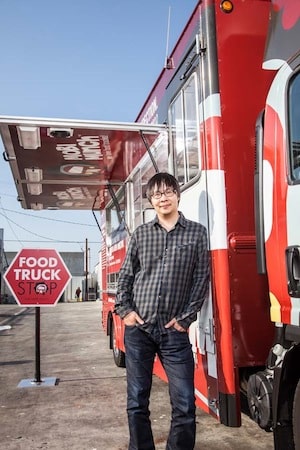
In 2007, former investment banker Josh Tang sold his successful online photography agency, WireImage, to Getty Images for a reported $207 million. By 2009, the self-described “serial entrepreneur” was in search of the next big idea—and that’s when he met Mark Manguera, founder and CEO of Kogi BBQ, the quintessential Los Angeles food truck perfectly fusing Korean BBQ with Mexican staples like burritos, tacos, and quesadillas. When Tang tried one of Kogi’s now-famous Korean tacos, something clicked into place.
“What Kogi was doing was very inspirational to me, and it really got the ball rolling on what I wanted to do next,” Tang says. “The reason why WireImage was so successful was because we leveraged the Internet. The Internet has democratized so many different industries, but the final frontier that hadn’t been reached yet was the culinary world. Restaurants are so cost prohibitive, but you can lease a food truck, utilize social media, and build a brand. What I wanted to be was the missing link to democratizing the food industry.”
The missing link turned into Tang’s latest endeavor, Mobi Munch, which has quickly become the nation’s premier mobile-food-service platform provider. Launched in 2009, the company offers custom-made Isuzu trucks equipped with a tailor-made point-of-sale solution and an intuitive Internet-based platform. Mobi Munch also offers brand and menu services to those interested in buying or leasing its trucks. However, before Tang rolled out his fleet of 40 trucks for public consumption, Mobi Munch launched two of their own concepts as a sort of trial-by-fire experiment. Plus, Tang wanted to roll up his sleeves and get his hands dirty in a way he never had before.
Tang had no food-industry experience, but the entrepreneur says it wasn’t necessary. The most important attribute an entrepreneur can have, he says, is being able to identify an opportunity and forming a team of knowledgeable people around the idea. “You don’t need to know how to do everything; you just have to know what you don’t know,” Tang says.
Tang founded the company with Ray Villaman, the former executive director of the California Restaurant Association, who started World Wrapps with Mobi Munch’s third cofounder, Aaron Noveshen, a restaurant industry veteran who also owns the Bay Area mini-chain Pacific Catch. Seven months after forming Mobi Munch, the team launched two of their own concepts: celebrity chef Ludo Lefebvre’s LudoTruck (featuring LudoBites Fried Chicken) in Los Angeles, and San Francisco’s The Chairman Truck (formerly Chairman Bao), both of which were incredibly well-received.
Getting to Know
Josh Tang
What is your favorite part of your workday?
Receiving positive reviews and feedback from our customers regarding our food and service.
How often do you eat at food trucks and which are your favorite?
I eat at food trucks twice a month. My favorites include the Chairman, LudoTruck, and Koja Kitchen.
What three words define Mobi Munch?
Innovative. Delicious. Enabling.
Which part of your job could you live without?
Dealing with mechanical issues with the trucks.
What food are you most passionate about?
I love almost every cuisine when it’s well executed.
What is the one thing you would change about the mobile-food industry?
I would like city regulations to become more food-truck friendly.
When it comes to owning a food truck, what three characteristics are the difference between failure and success?
Having passion and dedication for your product, understanding your unit economics, and knowing how to engage customers both offline as well as online.
“For whatever reason, I have an eye for where the hockey puck is going next, but I understand that a lot of it is also luck and timing,” Tang says. “I’m a first-generation immigrant from Asia, and, growing up, my family didn’t have a lot. You can work very hard and be very smart, but, at the end of the day, you need luck. Timing is key, and because I was so lucky with my first company, I feel this desire to give back, and Mobi Munch can do that. This is about people who love food and are interested in the food industry, but could never have their own brick and mortar. They can utilize one of our trucks to create a following, build their brand, and then take their next step. We’re not talking about a trend here; we’re talking about a paradigm shift. This is a movement, not a moment.”
Food trucks, or loncheras, have populated Los Angeles’ Mexican-American neighborhoods since the 1960s, but, despite offering decent food at affordable prices, the stigma of being “roach coaches” was hard to shake. That is, until the gourmet-food-truck explosion in the mid-2000s, when the mobile-food industry received a makeover. According to Tang, the mobile-food industry continues to attract people because everyone can cook and everyone needs to eat, making it an industry that can reach the absolute broadest spectrum of people. Owning a restaurant clearly isn’t a possibility for everyone, Tang says, but leasing a food truck is.
Mobi Munch was the first company in the country to realize that a food truck could be a way for many Americans to get ahead, but part of the problem was the industry had remained a little rough around the edges.
“It’s a scrappy industry, and there weren’t a lot of specifics about how to systemize the operation, how to optimize food costs, how to train employees,” Tang says. “These are things that the big guys—restaurant chains—are very good at, but there are a lot of things that the little guys—food trucks—do that huge chains can’t, like offering a very limited menu to ensure that everything is fresh, made-to-order, and well-executed. We’re about taking the best-in-class practices from the big guys and giving them to the little guys.”
Mobi Munch continues to branch off in new and unexpected ways, including its recent partnership with Aramark, the popular provider of food services, facilities management, and uniforms. Mobi Munch essentially created several brands for Aramark, fleshing out concepts and menus that will be used on university campuses. “We cut out a lot of the guesswork, because all of our trucks and concepts have been vetted to be profitable,” Tang says. “We’re marketing ourselves as the next operating system for food service. The old brick-and-mortar concept is out; this is the new OS.”

